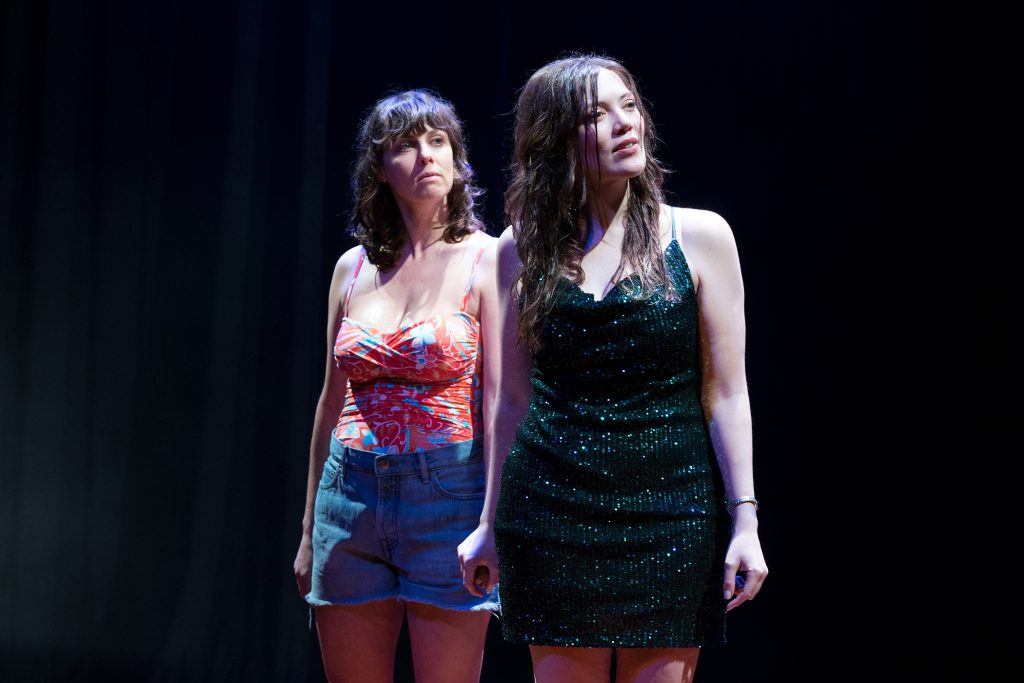
By Eric Marchese | Special to the NB Indy
How many different definitions are there for the word “clean”?
As Christine Quintana’s smashing new play “Clean” shows us, many more than you might first expect.
In fact, “Clean” excels in delivering the unexpected.
Part of this year’s Pacific Playwrights Festival at South Coast Repertory, and a co-world premiere with Vancouver’s Neworld Theatre, it’s not just a tour-de-force of writing but of acting as well. Though it conjures more than a dozen characters, its uses just two actors who embody and personify everyone within the orbits of the two main characters.
Factor in director Lisa Portes’ masterful hand in bringing Quintana’s words to life, and you have a striking new play that’s superbly written, acted and staged.
SCR is billing the play as “Clean/Espejos,” and that’s because Quintana has crafted a story not just of two women but of two divergent cultures, each with its own language, customs and history.
The first thing we notice is how deftly Quintana interweaves two disparate storylines relating the lives of two people with almost nothing in common. Fate causes the lives of Adriana (Lorena Martinez) and Sarah (Nell Geisslinger) to intersect by virtue of their being in the same place at the same time.
Even then, their interaction is almost non-existent. The script’s basic pattern alternates scenes featuring Adriana, then Sarah, as each delivers what amounts to a series of monologues. Adriana and Sarah’s paths do intersect, enriching the already satisfying tales of each of their lives.

The production is a genuinely bilingual experience, with the script having been adapted and its Spanish portions translated by Paula Zelaya Cervantes. Nearly all of Adriana’s dialogue is in Spanish, with her words translated into English and flashed at the audience as surtitles (kudos to Yee Eun Nam’s clean, easy-to-read projection design).
Likewise, every word spoken by Sarah is surtitled in Spanish. Thus, “Clean,” in its entirety and wire to wire, comes to us in both languages.
In doing so, it underscores what some watching might already know – that the cultures of the United States and Mexico are so mutually alien, there’s no way an Adriana and a Sarah could connect on anything but the most superficial level.
Flashbacks show Adriana eight years ago, at age 19, going to work as a maid at a swanky Cancun resort. The seemingly temporary job winds up as a career. Present day, she heads the entire housekeeping department, an impressively sizable staff of young Latinas.
Sarah has come from Vancouver for her younger sister’s wedding. The self-described black sheep of the family, she get smashed poolside to endures the ordeal of being her sister’s maid of honor – and in our first view of the character, Geisslinger is comically silly and loose.
Yet Sarah’s actions and conduct conceal pain born years earlier – and we learn the same of Adriana.
Quintana skillfully delineates these two as near-opposites: Adriana prizes order, neatness and cleanliness, her ingrained sense of duty exemplified by her fierce dedication to her work and her protective, maternal stance toward her staffers, which she calls her “girls.”
Martinez paints her as calm, level-headed and responsible, and far more mature than her chronological age.
Sarah is a study in chaotic confusion, the messiness that life can be. Played for laughs, her vocabulary is laced with profanity, including casually tossed F-bombs, and her non-stop stream of chatter is an ongoing rant directing diffuse anger at the world in general and her mom in particular.
Geisslinger’s distinctive Southern California / Valley Girl dialect and expert portrayal reveal’s Sarah’s sense of self-loathing and feeling adrift in life.
The script’s numerous uses of the word “clean” are noteworthy, each imparting a different wrinkle upon the word.
To wit: “I make clean what is dirty” (Adriana), a reference to the “fresh earth” being “scrubbed clean”; Sarah saying “clean the wound,” referring to her scraped, banged-up knee; Adriana, after a harrowing night, using a guest room shower that allows her to emerge “clean again”; and, early in the story, “I will forget what came before and start again, clean” – Adriana’s thoughts as she leaves home to start a new life working at the resort.
The death of Adriana’s father forms a fulcrum that informs her fate as well as Sarah’s. We witness the two women bonding, then taking a four-hour car ride to Adriana’s home town. Only later do we realize that we’ve seen something imaginary – yet the two scenes after the crucial “real” meeting of Adriana and Sarah reveal vital clues to both their personalities.
Both women conceal harsh truths about the past that are connected with their fathers. But the imagined scenes show that Sarah’s desperate need to “help” Adriana is driven by the need to connect with another human being. Adriana, though, masks resentment born of knowing Sarah can never have the slightest inkling as to her thoughts, feelings and life.
Quintana’s handling of the back-stories of both women skillfully, and subtly, exposes how men abuse their wives and daughters, whether through psychological or physical battery or actual, monstrous molestation. Late in the play we also realize that while Sarah is just starting to develop insight into herself, Adriana’s self-knowledge, however painful, is more extensive.
The production’s across-the-board attention to detail is meticulous, with Danielle Nieves’ costume design as just one example: Adriana’s teal and white uniform cleverly matches the décor color scheme of the resort’s guest rooms.
From start to finish, Quintana’s concept is spot-on brilliant. Every aspect of this brilliance is bolstered and magnified by SCR’s execution of it, from direction and acting through a production design that works in lock-step with the script’s well-thought-out ideas and often overwhelmingly powerful emotions.
Julianne Argyros Stage, South Coast Repertory, 655 Town Center Drive, Costa Mesa. Through April 10. Running time (intermission included): Two hours, 15 minutes. Tickets: $26 to $98. Purchase/information: (714) 708-5500, www.scr.org.
